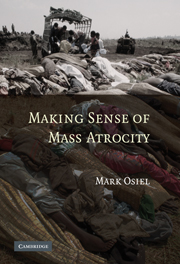Book contents
- Frontmatter
- Contents
- Dedication
- Preface
- Introduction
- 1 The Challenge of Prosecuting Mass Atrocity
- PART I LEGAL RULES AND THEIR PROBLEMS
- PART II THE POLITICAL CONTEXT OF LEGAL CHOICE
- 7 Must National Prosecutions Serve Global Concerns?
- 8 The Conflicting Incentives of National and International Prosecutors
- PART III NEW POSSIBILITIES AND SOLUTIONS
- Conclusion
- Index
- References
8 - The Conflicting Incentives of National and International Prosecutors
Published online by Cambridge University Press: 15 September 2009
- Frontmatter
- Contents
- Dedication
- Preface
- Introduction
- 1 The Challenge of Prosecuting Mass Atrocity
- PART I LEGAL RULES AND THEIR PROBLEMS
- PART II THE POLITICAL CONTEXT OF LEGAL CHOICE
- 7 Must National Prosecutions Serve Global Concerns?
- 8 The Conflicting Incentives of National and International Prosecutors
- PART III NEW POSSIBILITIES AND SOLUTIONS
- Conclusion
- Index
- References
Summary
Domestic courts are important for developing international law wherever countries accept it as locally enforceable, as many increasingly do. This law can develop in a “coherent” manner, some contend, however, only if courts at national and international levels interpret its content consistently. This is unlikely to occur when national and international prosecutors favor disparate doctrinal options for conceptualizing the same misconduct.
Their preferences are likely to diverge when each option has opposite consequences for their careers. This is sometimes true of the choice between superior responsibility and enterprise participation. International prosecutors face incentives to favor the latter, and national prosecutors the former (and other ways to narrow the law's reach), especially when the transfer of power from old leadership is not yet complete.
INCENTIVES FOR INTERNATIONAL PROSECUTORS
Prosecutors in The Hague have their eyes on a prize rather different – much larger, in their view – from that valued by national prosecutors: the development of international criminal law, as an institutional resource to which the world may increasingly turn for punishing – and perhaps preventing – mass atrocity, when states are “unwilling or unable” to do so in national courts. The growth of “criminal enterprise” law, examined in this study, is not the only evidence of their successful urgings on the tribunal in this regard. In response to prosecutorial prompting, “[a]lthough the [UN Security] Council declared that the [ad hoc international criminal] Tribunals would not create new law, the ICTY has substantially broadened the rules governing civil wars, and it has lowered the thresholds for the triggering of the rules on international conflicts,” as one careful scholar observes.
- Type
- Chapter
- Information
- Making Sense of Mass Atrocity , pp. 169 - 184Publisher: Cambridge University PressPrint publication year: 2009



